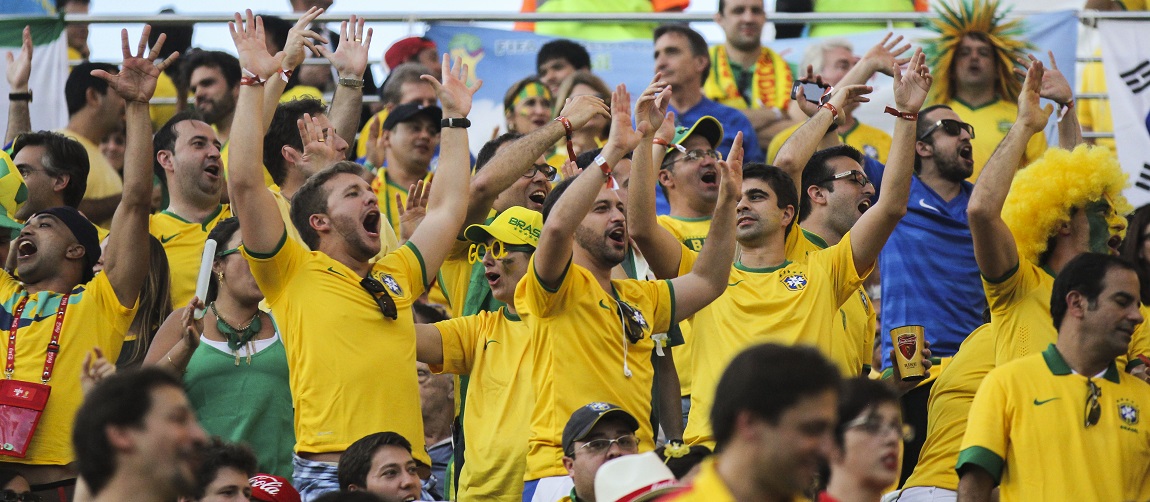Poor Mohamed Salah. In an image tweeted out by the New York Times chief soccer correspondent Rory Smith, the Egyptian winger is pictured with his hand tightly in the grip of Ramzan Kadyrov, the head of the Chechen Republic, and all-round very nasty man. Salah does not look like he wants to be in the image his face pulled into a barely-disguised “WTF” grimace.
This @marcbennetts1 image of Mo Salah with Ramzan Kadyrov is as good an illustration of the World Cup as a political/propaganda tool as you’ll get. Proximity to these players shows power, boosts profile, confers some form of legitimacy. pic.twitter.com/DcTyRzldDd
— Rory Smith (@RorySmith) June 11, 2018
It’s not Salah’s fault that these things happen. The Egyptian Football Association, in its wisdom, decided to base the team in Chechnya for the duration of its World Cup campaign. According to the Telegraph, Kadyrov arrived at the facility and asked to take a photo with Salah, who is still recovering from the shoulder injury he sustained in the Champions League final in May.
Why the controversy? Consider Kadyrov’s latest project: he wants to rid Chechnya of gay and bisexual men, and last year he unleashed a campaign of terror against those Chechen people. He is by no stretch of the imagination a talisman for human rights. Yet there he was, clearly positioning himself to get some of that Salah shine for himself.
What was Salah supposed to say? No? Would it have been worth pissing off his host? Who knows but the picture went ahead, and the backlash was inevitable.
A similar controversy erupted a few weeks before the Kadyrov Salah one: the Turkish president Recep Tayyip Erdogan, currently seeking re-election to extend his controversial reign, took photos with footballers Mesut Ozil and Ilkay Gundogan, both German citizens of Turkish ancestry. (The German-born striker Cenk Tosun also took part in the photo shoot, but his decision to play for Turkey means that he attracted far less attention.) That picture was taken as a tacit endorsement of Erdogan, prompting rebukes from the German Football Association and even the chancellor Angela Merkel.
Germany’s Ilkay Gundogan: Erdogan photo controversy difficult for me, Mesut Ozil https://t.co/tdnw6lzw4g pic.twitter.com/89BZl3fyXN
— World Cup 2018 (@WorldCupEN) June 6, 2018
These events are just the latest signal that football serves a much bigger purpose than mere entertainment. It is still and will continue to be, political. It always has been so, but people tend to pay attention during the World Cup, because the nation-state emphasis necessarily means that the event can be useful currency for politicians, of practically any stripe. (Even for North Korea, who participated in the 2010 FIFA World Cup.)
This reality is not unique to the World Cup or international football – see Arsenal Football Club’s new, £10 million-per-annum deal with the government of Rwanda – it just becomes more overt during this tournament.
I could talk about how the English Premier League positioned itself as the perfect place for Russian oligarchs who, having plundered the country, now need somewhere safe to store their illicit billions. Or how Manchester City and the constellations of clubs around it have become Abu Dhabi’s public relations arm, or how Paris St-Germain is the same for Qatar.
The 2018 FIFA World Cup is going to be a massive PR boon for the regime of Vladimir Putin, as will the next one for Qatar. So what can we do about that?
Switching off the TV would not be a good move and I don’t mean just because such a protest would be meaningless in the face of how massively popular the tournament is. (The 2014 final was watched by an estimated one in seven people on the planet.) It’s the idea of giving up international football to the thugs, creeps, murderers, and dictators who try to profit in some way from its shine. (Let’s not even get into FIFA’s entirely corrupt relationship with the multinational companies that sponsor it.)
This is the first World Cup since the corruption scandals at FIFA finally engulfed and took down Sepp Blatter. The organisation today plays at being more transparent, cleaner, but at heart, every football fan knows that the game’s top administrators are laughably corrupt.
The increasingly unsettling invasion of brute politics into football should, of course, unsettle us all, as fans of the game. The irony is that by choosing to give the 2018 and 2022 hosting rights to such blatantly evil administrators, FIFA may have opened more eyes to the corruption of the game.
But the World Cup is still at its heart an event that allows us just for one-month a shared human experience. So make this World Cup about the memories you create with your family and your friends. Make it about the exciting moments on the pitch that you’ll carry with you for the rest of your life. No Kadyrov or Erdogan can poison that.









